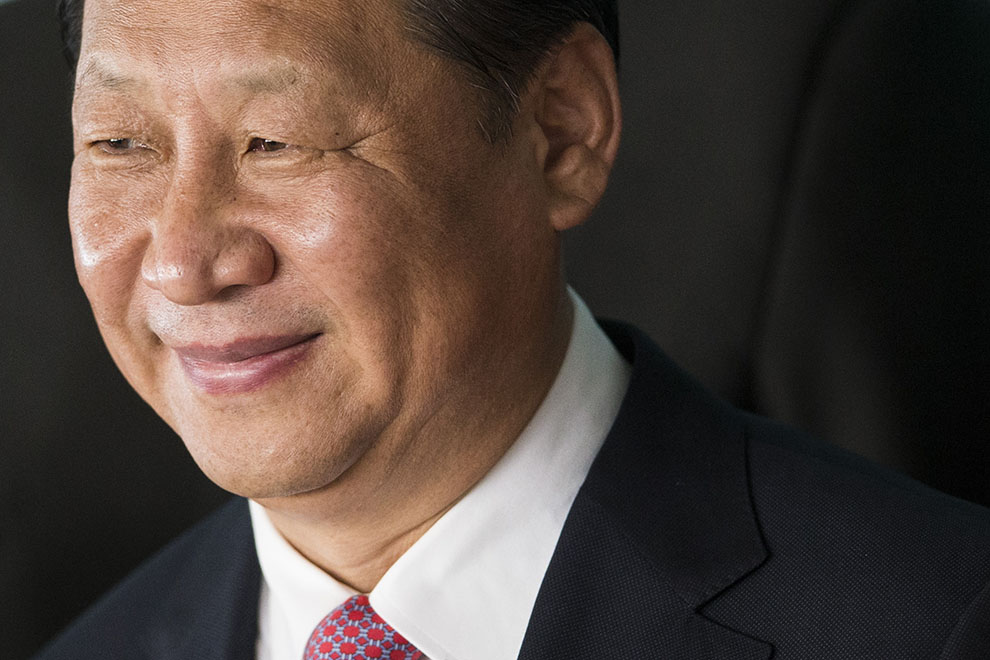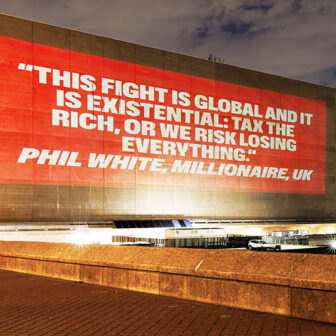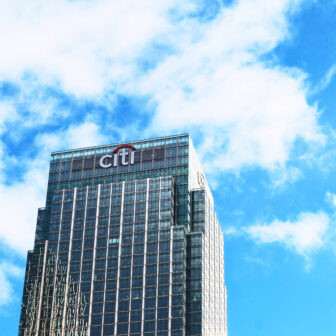Chinese writer Yu Jie knows how to irritate important people. In 2010, during a period when the Chinese premier of the time, Wen Jiabao, was regarded as the most liberal and likeable of the elite line-up, he wrote a book that described Wen as “China’s best actor,” a ruthlessly effective operator who had managed to conceal this hard edge under a benign, avuncular persona. For his pains, Yu was taken in by state security and beaten up. The harassment forced him to leave for Hong Kong and then the United States, where he is now based.
With that background in mind, it is no surprise that his latest book, dealing with current president Xi Jinping, pulls no punches. The title says everything: Xi Jinping: China’s Godfather. And to rub this message in, the illustrations include, somewhat incongruously, a photo of Marlon Brando in the classic films of the early 1970s, and a current portrait of Xi Jinping, assuming very similar body language and gestures. The conclusion Yu would like us to draw is clear enough. We are looking at a leader stronger, more ruthless and more focused on power than we have seen in China since the time of Mao, someone more akin to a mafia leader than a political one.
It is no surprise to find that this highly polemical book has been strongly condemned by Beijing and is unavailable in China. More than that, its publisher, Yiu Mantin, was detained in Shenzhen on a visit there in January 2014. But beyond the controversy about the author, the publisher and the banning, what of the book’s argument?
Any high-profile political figure in modern China is inevitably compared to the master of post-1949 political plotting and power accumulation, Mao Zedong, who leaves a vast shadow across the country he was so instrumental in reunifying and ruling. Despite attempts to conceal, bury or reduce his influence, his grip as an iconic figure remains.
For the current members of the Standing Committee of the Politburo, memories of Mao’s final years in power are mostly sour. Each entered adolescence during the Cultural Revolution, when their families were in some cases persecuted and in others dispersed to areas well away from their homes. Only two of these leaders have referred directly to this period – Yu Zhengsheng, chair of the party’s national committee, and Xi Jinping – and neither did so positively. The period of Maoist revolutionary zeal leaves a complex memory stain that has increasingly been dealt with over the last few years by forced forgetfulness.
And yet the symbolic resources that Mao created and deployed to such effect are still useful, and the central claim in Yu Jie’s book is that these lie at the heart of Xi’s own project. As a young man working on a commune in Shanxi province in the late 1960s into the early 1970s, Xi was exposed, like everyone else of his generation, to saturation Maoism. It was the only available system of thought. For Yu, this background has fundamentally shaped Xi’s world. The narrative of Maoist revolution, and the attitude Mao had to intellectuals and to those who didn’t see eye to eye with him, was impressed on Xi and he is using it now. In particular, Yu refers to the “Yenan spirit,” the mood in the early 1940s before Mao led the Communist Party and its army to power, when he consolidated his power in the party and undertook the first of a sweeping series of purges to “cleanse the ranks.” According to Yu, this kind of vision of power and its uses, and a utilitarian ethics where ends justify means, underpins Xi’s worldview.
The argument gets personal when Yu refers to Xi Jinping’s relationship with his father, which is officially portrayed as close. This is probably the most incendiary part of the book, as it digs into that most intimate territory for Chinese leaders – their closest family relations, and in particular their links with their parents. Yu comes back to something that is widely known: how Xi Zhongxun, Xi’s revered father, was felled in 1962, several years before the Cultural Revolution, during an anti-rightist purge, and was then largely sidelined, either in jail or under house arrest, until after Mao’s death in the late 1970s. Over this period, from the age of around nine to nineteen, Xi didn’t ever see his father and therefore had no time to form a deep bond. Xi Zhongxun’s liberal leanings and his support in 1989 for rebelling students mean that politically he was more a burden than a support to his son. As final evidence for this view, Yu cites Xi the elder’s “banishment” to the southern city of Shenzhen during his final years.
The conclusion Yu would like readers to draw is that the official version of Xi Jinping’s links to his father is no more than artful manipulation – a carefully constructed myth that conceals a power builder, as ruthless and purposeful as Mao, who is filling key administrative, party and government positions with his allies.
This is a dramatic and colourful argument. But whether it maps what is happening is another matter. The tendency to describe Chinese political figures as grand manipulators, controlling the world around them and undertaking fiendish deeds, is longstanding and deeply embedded. In the three-and-a-half decades since Mao died, each of his successors – Deng Xiaoping, Jiang Zemin and, occasionally, Hu Jintao – have been accused of similar things.
There is one very good reason why a new Mao is unlikely to emerge. The world in which he operated – in which he came to power and exercised that power in such a complete and often disastrous fashion – has vanished. Chinese society is utterly different from that which existed when he was in charge. Not the least of these differences is that it is now predominantly urban, and will become increasingly so. Mao was the hero and leader of rural China. Urban China regarded him with largely justifiable distrust and, remarkably, the urban population actually declined through resettlement and rustification campaigns during his period in power.
Another huge difference is that for any modern leader of China, the party as an institution is all-important. Mao waged war on the Communist Party during the Cultural Revolution, and once even threatened to leave it, return to the countryside and lead a rebellion to seize power. His campaigns decimated its leadership and nearly brought it to its knees. No leader since would have been able to get away with that kind of behaviour. In fact, Deng and subsequent leaders have made strengthening the party their core priority, and Xi is the beneficiary of this process. If modern China does have a strongman, it is the Communist Party itself. An individual trying to muscle in on this would be high-risk, and face huge opposition. Look what happened to Bo Xilai when he was accused of serving his own ambitions rather than those of the party.
The important thing to understand about Xi is that he is at the heart of a leadership that has a collective purpose that arises from the demands of party unity. It is hard to see how else Xi and his team would be able to prosecute the anti-corruption purge that has been going on since early 2013, extending into the heart of some of the key institutions of power in China, from the military to government to the party itself. In this context, the party looks increasingly like the Catholic Church – an organisation that tries to be less a vehicle of specific interests and objectives and more a cultural/social/ideological entity – an entity that demands belief of some sort from its adherents and pursues a broad spiritual vision (in this case, a vision of a “rich, strong, powerful country”).
We shouldn’t underestimate the powers that Xi is exercising, but if we overestimate them then we are also making a mistake. Xi is no Godfather; he is the faithful servant of the party. As long as he continues to be so, his position will be secure. But if ever he tried to assert his own networks and interests over those of the party then there would be no nice protocol about how he would be dealt with. His felling would be as brutal as that meted out to Bo Xilai. This is the great secret of modern China. Individual political leaders are not the key. The institution of the party is. And the people who serve this better are the ones, in the end, who succeed. •




